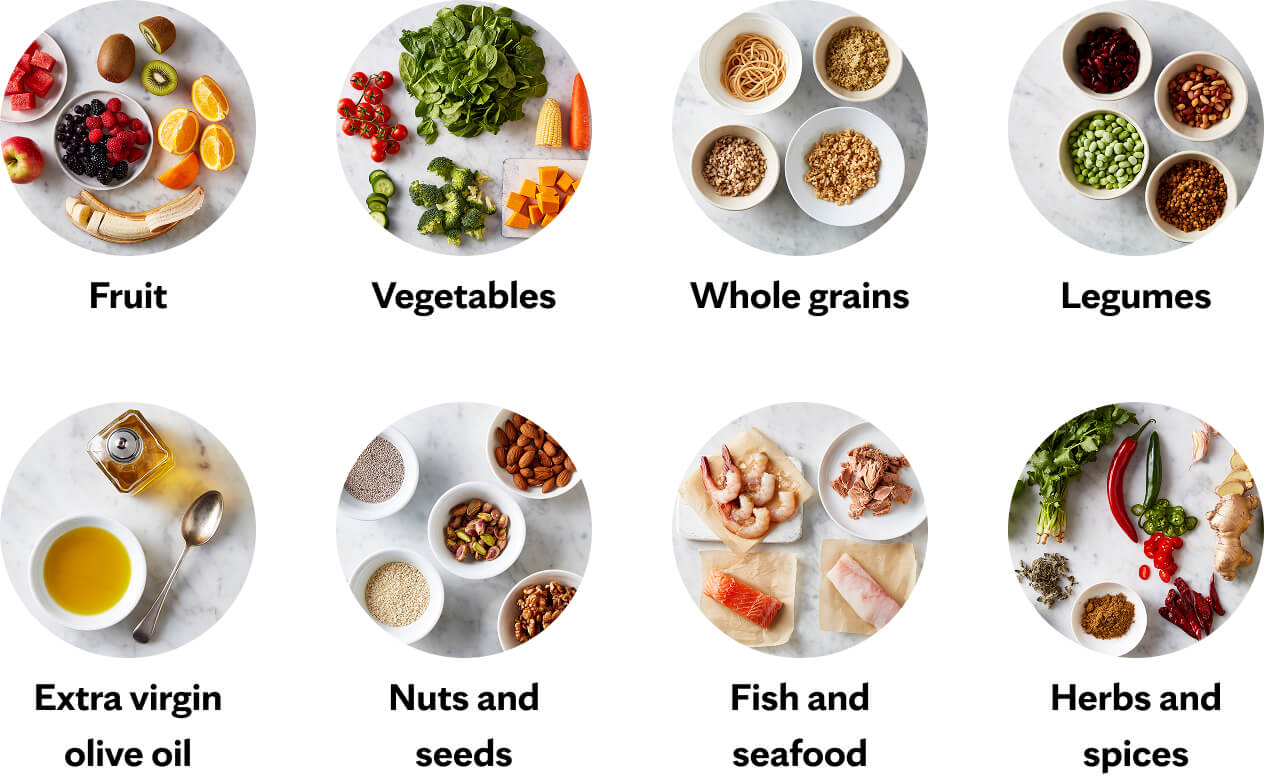Mediterranean diet 101: core principles and proven health gains

Lead Dietitian for the Mayo Clinic Diet
The importance of picking a healthy diet
Choosing the right diet isn’t just about losing a few pounds—it’s about fueling your body, protecting your heart, and aging gracefully. Among the many popular eating styles, the Mediterranean diet stands out for its delicious simplicity and long list of scientifically proven benefits.
Whether you’re navigating a new diagnosis like high blood pressure or high cholesterol, trying to reduce inflammation, or simply striving for a sustainable way to manage your weight, this plant-forward, heart-healthy approach offers more than a trend—it’s a lifestyle rooted in longevity and balance.
The Mayo Clinic Diet includes a Mediterranean meal plan option that combines the flavor-rich traditions of southern Europe with Mayo Clinic’s expertise in health and nutrition. This guide will walk you through the core principles, health gains, food lists, and sustainable strategies that make the Mediterranean diet a standout choice for lifelong well-being.
What is the Mediterranean diet?
Origins and cultural background
The Mediterranean diet is inspired by the traditional eating patterns of countries bordering the Mediterranean Sea, including Greece, Italy, and southern France. Researchers first took note of the region’s eating habits in the 1960s, observing notably low rates of heart disease and high life expectancy, especially in rural Crete and southern Italy.
Rooted in fresh, seasonal, and minimally processed foods, this style of eating is more than a nutritional template—it’s a reflection of local culture, community, and the joy of shared meals.
How it compares to Western eating patterns
Unlike the typical Western diet, which often includes processed snacks, red meats, and sugary drinks, the Mediterranean diet emphasizes nutrient-dense, whole foods. It’s lower in saturated fats and refined carbohydrates and higher in fiber, antioxidants, and healthy fats from sources like olive oil and nuts.

The Mediterranean diet features lean protein such as fish, vegetables, fruits, whole grains and healthy fats
Rather than focusing on restriction, the Mediterranean approach encourages mindful enjoyment of meals, seasonal variety, and balance. This makes it not only effective, but also enjoyable and sustainable.
What are the core principles of the Mediterranean diet?
Focus on whole, plant-based foods
At the heart of the Mediterranean diet are fruits, vegetables, whole grains, legumes, and nuts. These plant-forward staples provide fiber, antioxidants, and phytochemicals that promote digestive and cardiovascular health.
Aim for a colorful variety on your plate. Tomatoes, leafy greens, eggplant, beans, and lentils are all cornerstones of Mediterranean meals.
Healthy fats (olive oil, nuts)
One of the defining features of the Mediterranean diet is its emphasis on healthy, unsaturated fats—especially olive oil. Replacing butter or margarine with olive oil reduces LDL (“bad”) cholesterol and supports brain and heart health. Nuts like almonds and walnuts are also encouraged in moderation.
Moderate dairy, fish, and poultry
Cheese and yogurt are enjoyed in small portions, often as part of a meal rather than a snack. Fish and seafood—especially fatty fish like salmon or sardines—are central to the plan and are typically eaten 2–3 times per week. Poultry and eggs are eaten occasionally.
Minimal red meat and sugar
Red meat is consumed sparingly—perhaps once a week or less. The diet also discourages sugary desserts and sweetened beverages, replacing them with fresh fruit, herbal teas, or water.
Social and mindful eating
Meals are about more than nutrition—they’re moments of connection. Eating with family and friends, savoring each bite, and slowing down during meals are just as important as what’s on your plate. This mindful approach may contribute to the diet’s emotional and metabolic benefits.
Video: Dr. Hensrud offers advice on starting a weight loss program
What are the benefits of the Mediterranean diet?
Heart health and cholesterol
Numerous studies have shown that the Mediterranean diet reduces the risk of heart disease by lowering LDL cholesterol and improving blood pressure. This makes it a cornerstone of the Mayo Clinic Diet for Heart Health.
Reduced risk of diabetes
Its focus on fiber-rich, low-glycemic foods helps stabilize blood sugar and improve insulin sensitivity—making it a smart choice for those managing or preventing type 2 diabetes.
Brain and cognitive benefits
The antioxidants and omega-3s in this eating pattern have been linked to better memory, focus, and even reduced risk of Alzheimer’s disease. A growing body of longevity research supports its neuroprotective effects.
Longevity and aging
Blue Zone studies—which examine the world’s longest-living populations—consistently highlight Mediterranean-style diets as a factor in healthy aging. These populations enjoy lower rates of chronic disease and better overall quality of life well into their 80s and 90s.
Mediterranean diet food list

Staples to include
- Extra virgin olive oil
- Fresh fruits and vegetables (e.g., tomatoes, leafy greens, citrus)
- Whole grains (e.g., bulgur, farro, brown rice)
- Legumes (e.g., lentils, chickpeas, cannellini beans)
- Fish and seafood (especially fatty fish)
- Nuts and seeds
- Low-fat dairy (yogurt, cheese)
- Herbs and spices (basil, oregano, garlic)
Foods to limit
- Red and processed meats
- Refined grains and sugary snacks
- Sweetened beverages (soda, sweet tea)
- Butter and cream
- Highly processed packaged foods
Mediterranean diet: 1-day meal plan
Here’s a flavorful day from the Mayo Clinic Diet Mediterranean meal plan:
| Breakfast | Quick roasted tomato & feta bruschetta on whole-grain toast, topped with avocado and served with strawberries |
| Lunch | Cannellini bean & vegetable salad with grilled zucchini and red peppers, drizzled with olive oil and balsamic vinegar. Served with toasted whole-wheat pita chips |
| Dinner | Fish stew with green beans, asparagus, and cherry tomatoes simmered in olive oil and herbs. Finished with spinach and capers. |
| Snack | Fresh fruit and crunchy veggie sticks like cucumber and bell pepper |
What makes the Mediterranean diet sustainable?
The Mediterranean diet isn’t about strict rules or cutting out entire food groups. Its flexibility, variety, and focus on whole foods make it realistic for the long haul. Here’s why:
- Affordability: Beans, grains, and seasonal produce are budget-friendly staples.
- Flavorful meals: Herbs, citrus, garlic, and olive oil create satisfying meals that don’t feel like “diet food.”
- Cultural adaptability: You can incorporate local and family traditions while sticking to Mediterranean principles.
This approach not only helps people stick with it—it transforms how they think about food, health, and weight management.
Ready to try the Mediterranean diet?
The Mediterranean diet offers more than a path to better heart health or weight management—it promotes a way of living that’s rich in flavor, community, and vitality. Whether you’re just getting started or ready to refresh your wellness journey, this sustainable eating pattern is one of the most researched and respected around.
With the Mayo Clinic Diet, you can experience the benefits of this proven approach in a structured, supportive program that offers flexibility and long-term success. You’ll have access to Mediterranean meal plans, heart-health tools, a supportive community, and practical tips tailored to your goals.
Join the program today to begin your journey toward lasting health.
Frequently asked questions
Is the Mediterranean diet good for weight loss?
Yes. While not designed as a weight loss diet, the Mediterranean diet supports weight loss by emphasizing fiber-rich, nutrient-dense foods that promote satiety. It’s particularly effective when combined with portion control and physical activity.
Can I follow the Mediterranean diet if I’m vegetarian or vegan?
Absolutely. While fish and dairy are traditional components, plant-based versions are easy to follow. Simply emphasize legumes, whole grains, nuts, seeds, fruits, and vegetables, and use olive oil as your primary fat source.
How much olive oil should I eat daily?
Moderation is key. A general guideline of 1–2 tablespoons of extra virgin olive oil per day, used in cooking or drizzled over meals, although that amount varies depending on your weight management goals. On the Mayo Clinic Diet Mediterranean meal plan, members have 6 units of Fats a day, equivalent to 2 tablespoons of olive oil, however, these Fat units are typically distributed across olive oil and nuts.
Can the Mediterranean diet help with inflammation?
Yes. Its abundance of anti-inflammatory foods like fruits, vegetables, whole grains, olive oil, and fatty fish can help reduce chronic inflammation—a root cause of many diseases.
Related Posts
Explore Topics
Success Stories (34) Food & Nutrition (25) Exercise (3) Habits & Motivation (12) Weight-Loss Medications (16) Weight Loss (4)

Free weight loss calculator
Discover how long it will take to reach your weight loss goals with our free weight loss calculator.